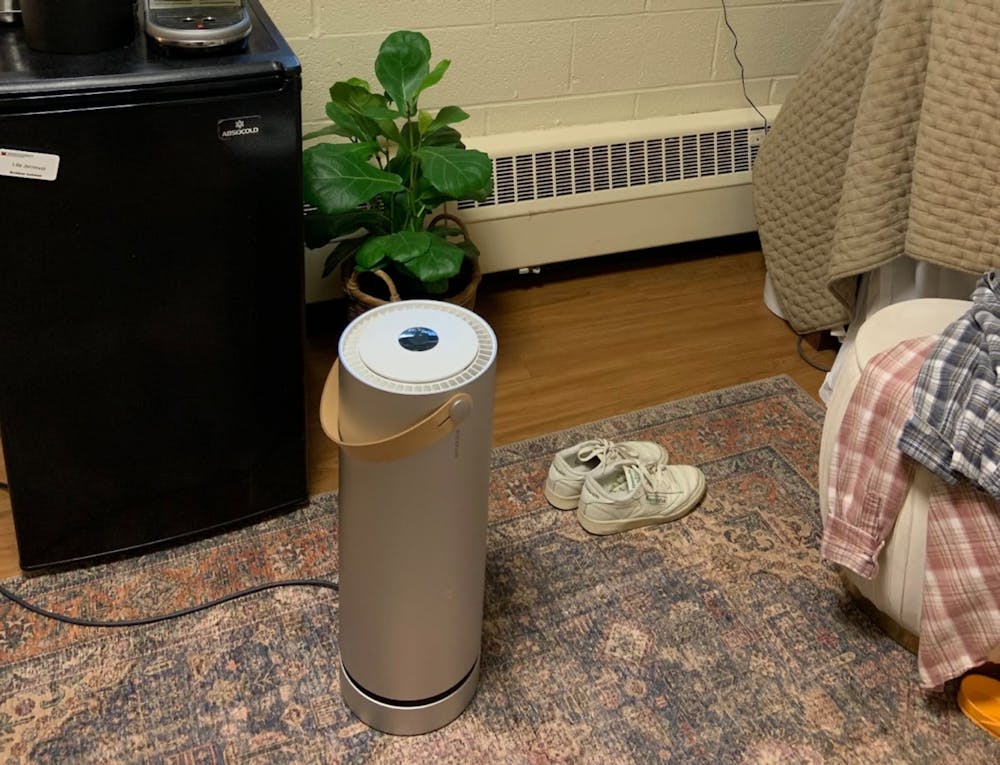Do you remember that first encounter with the scenic paysage of Miami University? The first time you either visited or laid eyes on campus and were mesmerized by its greenery and nearby vastness of nature?
I originally come from Kumanovo, a city in North Macedonia that had one of the highest rates of air pollution in the world during the COVID-19 pandemic. Currently, North Macedonia ranks 31st on the list of 194 countries when ranking the toxic particles in our skies that cause air pollution. Knowing this, you could imagine the excitement I experienced on move-in day: trees everywhere, fresh air, clean roads, gigantic and colorful trash cans.
No matter how much fresh air I breathe sitting by the Seal, whenever I walk into the residence halls I am greeted by my fellow students’ obsession with air purification. If you are a returning student living in the residence halls, you already know that air purifiers are an invasive species. If you are a new student, there was some time when you wondered what to bring with you on campus. If an air purifier didn’t find itself on your list, then surely it was on your roommate’s.
“What is up with higher education and air purifiers?” I wondered as I entered my friend’s room in Thomson Hall. She had an enormous air purifier and we had just picked up her air dehumidifier from the package center, plus a “smell good, feel good” plug-in air freshener for her outlet.
Air purifiers on this campus seem to be boxed paradoxes. Breathe in by the veranda of Armstrong, then run to your room to breathe out.
It might surprise you if I told you that it was actually my first time seeing one in real life when I moved to the United States. Air purifiers at home were a luxury not many could afford, and quite frankly, if the standard of living was not much higher here, I would probably say the same. Students, their parents and families are buying expensive air purifiers with the prices going up to $150 and they don’t seem to regret it.
“My mom is a huge germaphobe and it brought her comfort to know that I have an air purifier in the room,” said Olive Abram, a sophomore living in Stoddard Hall. She said she feels lucky that last year she lived in a renovated residence hall, otherwise she wouldn’t have made it.
Her friend lived in Morris Hall last year and had a fancy air purifier that could tell him the air quality in the room.
“It was constantly on red, believe it or not!” she said.
Talking to Abram, I had to sit down and self reflect: Are air purifiers good or bad? My mind was a mess. Every time I walk into my friend’ room, I feel as if the air is lighter, wrapping itself around me as a soft blanket. Yet, I don’t own an air purifier and I am still surviving.
Julia Rode, a first-year studying political science who currently lives in McBride Hall, said that an air purifier was the first thing one of her roommates pulled out on move-in day. Her other roommate happened to test positive for COVID-19 during the first week of class and Rode was amazed to find out that despite spending three days in the same room with her, they repeatedly tested negative.
“I don’t think any of us thought that the air purifier would protect us from disease, initially it just made the dorm feel cleaner,” Rode said. “But after that COVID incident, it ended up in a sense being a preventative measure because we did not get sick.”
Enjoy what you're reading?
Signup for our newsletter
It seemed to me that what Rode was saying is that air purification brings comfort to students, and who can argue against that?
Another thing that seems to be the case is that parents are actually the ones actively buying and enforcing air purification on their children. It is, however, worth asking ourselves one more time if air purifiers are legitimate devices or consumer scams.
The U.S Department of Education finds an inevitable tie between the prevention of COVID-19 and air ventilation. Media outlets such as The Guardian, Vox and different community organizations focused on enhancing learning have long ago opened the question of whether air purification can and will boost students’ academic performance.
So, it seems like it is not only Miami students that are following the trend of air purification but it is rather a national phenomenon made local.
The Bureau of Labor Statistics found out that college students typically spend 16 hours of their day indoors. Given that amount of time, there must be social-environmental and health concerns related to air quality that tie in to the college experience. Still, an air purifier may not be the perfect solution, and it could be difficult to find “the right one” to solve the problem.
I am still not convinced that I should get an air purifier for myself, but talking to students made me realize that we really are in some ways the post-COVID college generation. Our concern with our health is as physical as it is emotional. The events that are upon our world shake us to the core: we are vulnerable and scared of leaving the world without making an impact on it like no other generation ever was.
Anastasija Mladenovska is a second-year political science, finance and Russian, East European & Eurasian studies triple major from Macedonia. She is involved with the Honors College and Scholar Leaders. She also volunteers for the League of Women Voters of Oxford.




